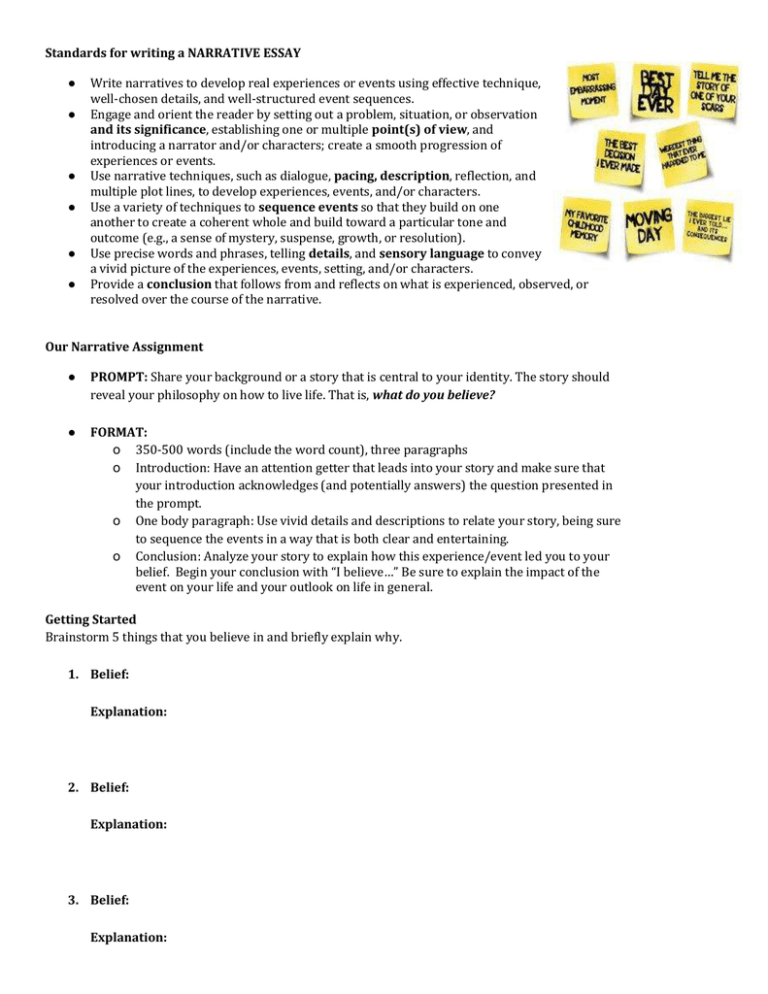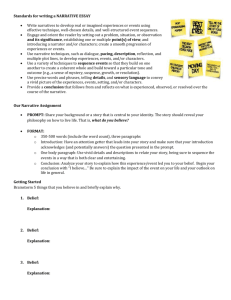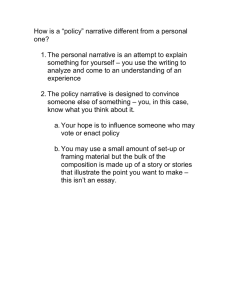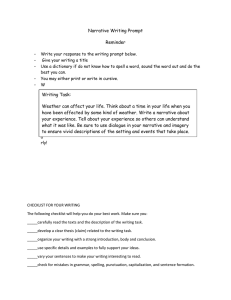Document 17908074
advertisement

Standards for writing a NARRATIVE ESSAY ● ● ● ● ● ● Write narratives to develop real experiences or events using effective technique, well-chosen details, and well-structured event sequences. Engage and orient the reader by setting out a problem, situation, or observation and its significance, establishing one or multiple point(s) of view, and introducing a narrator and/or characters; create a smooth progression of experiences or events. Use narrative techniques, such as dialogue, pacing, description, reflection, and multiple plot lines, to develop experiences, events, and/or characters. Use a variety of techniques to sequence events so that they build on one another to create a coherent whole and build toward a particular tone and outcome (e.g., a sense of mystery, suspense, growth, or resolution). Use precise words and phrases, telling details, and sensory language to convey a vivid picture of the experiences, events, setting, and/or characters. Provide a conclusion that follows from and reflects on what is experienced, observed, or resolved over the course of the narrative. Our Narrative Assignment ● PROMPT: Share your background or a story that is central to your identity. The story should reveal your philosophy on how to live life. That is, what do you believe? ● FORMAT: o 350-500 words (include the word count), three paragraphs o Introduction: Have an attention getter that leads into your story and make sure that your introduction acknowledges (and potentially answers) the question presented in the prompt. o One body paragraph: Use vivid details and descriptions to relate your story, being sure to sequence the events in a way that is both clear and entertaining. o Conclusion: Analyze your story to explain how this experience/event led you to your belief. Begin your conclusion with “I believe…” Be sure to explain the impact of the event on your life and your outlook on life in general. Getting Started Brainstorm 5 things that you believe in and briefly explain why. 1. Belief: Explanation: 2. Belief: Explanation: 3. Belief: Explanation: 4. Belief: Explanation: 5. Belief: Explanation: Brainstorm and formulate 5 significant events/experiences from your life that helped shape your personal philosophy (what you believe). You will ultimately pick one event/experience to help you write your 350-500 word narrative essay that answers the question presented in the prompt. Good luck and have fun! 1. Significant event: My belief about life that stemmed from this event: 2. Significant event: My belief about life that stemmed from this event: 3. Significant event: My belief about life that stemmed from this event: 4. Significant event: My belief about life that stemmed from this event: 5. Significant event: My belief about life that stemmed from this event: How this all relates to the personal essay (for college applications): • • • • Attention-Getter: Fred Hardagon, retired Dean of Admissions at Stanford University, offers this advice about college admissions essay writing: “When you write your essay, consider simply telling a story […] I long ago figured out that some of the best essays I’ve ever read are simply stories well told. Considering the demands of the prompt, conceive an attention-getter that illustrates introspection in relation to the prompt. Consider creative ways that you could paint this self-examination: anecdote, poem, interview, etc. Contextualization: Explain the attention-getter in relation to your prompt. You need to show your comprehension of the prompt, so make the context of your attention-getter clear here. Contextualization may be brief and should function as a transition into the “insight” of your story. Insight: A personal narrative should reflect a deeper understanding or emotion that developed through the course of your experience. This insight may be in the form of a lesson learned or an epiphany about your world, the people in your world, or simply yourself. Revelations are not always positive. Real revelations are nuanced and most likely cannot be reduced to bumper sticker adages. Writing into the Contradictions: Avoid clichés. Contradictions are natural in life, and a good story should reveal these natural contradictions. For example, a student may write about the lessons he/she may have learned as an athlete, musician, a science student, etc. However, students often write only about positive revelations, but these tend to be halftruths. All learning experiences involve struggle, discomfort, and eventually insight. Writing towards this type of discomfort will be much more interesting for your audience – the admissions officers. Approximate Calendar Thursday, May 12 Ch. 16 Friday, May 13 Introduction of narrative; Start looking at samples; HW: Read Catcher Monday, May 16 Narrative Workshop; HW: Catcher Ch. 19-20 Catcher Ch. 9-16 Quiz; Finish sample work; HW: Catcher Ch. 17-18 AND Brainstorming Tuesday, May 17 Wednesday, May 18 Thursday, May 19 Friday, May 20 Narrative Workshop; HW: Catcher Ch. 21-22 Discuss synthesis; Wrap up narrative discussion; HW: Catcher Ch. 23-24 Practice Synthesis; HW: Narrative Essay Practice Synthesis; HW: Catcher Ch. 25-26 Monday, May 23 Tuesday, May 24 Friday, May 27 Catcher Ch. 17-26 Quiz; Prep for Final Socratic Seminar Final Socratic Seminar Review Period; THE FINAL


